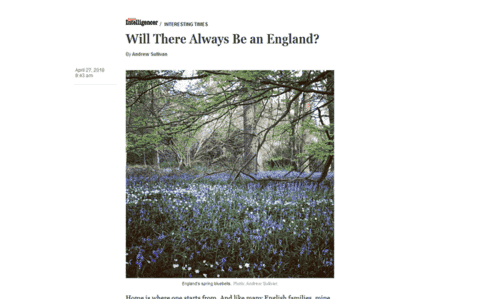


04/28/2018
Andrew Sullivan writes in New York Magazine:
Will There Always Be an England?
Andrew Sullivan
April 27, 2018 8:43 am
… London is close to unrecognizable from the city I knew as a teen. Its skyline has a touch of Dubai to it, the wealth is tangible, even obscene, the prices absurd, the energy young and incredibly diverse. “It’s not our capital any more, is it?” my brother asks, as if seeking confirmation from me. I can see what he means, by virtue of not being there continuously as change accumulated and transformed. In a little less than a week in London, I have yet to buy anything from someone English. Everywhere I hear foreign accents or one of the more than 300 languages London now incorporates. Thirty-seven percent of the capital’s population is foreign-born — the same as New York City — and that share is predicted to be 50 percent by 2031. But New York has always been a thriving immigrant city; newcomers have always defined the place, and it’s just one of several vast metropoles in America. But London is the overwhelmingly dominant city in the U.K., and has never previously been a city of immigrants in the English psyche. London, in fact, is synonymous with the essence of England, and has been a national center since the Roman era. The counties surrounding it are called the Home Counties, because London has always been home.
I love the new London, but then I would, wouldn’t I? I’m an American now, and became one in part because I fell in love with its racial and cultural diversity. But most people, not gifted with a great education and lucky breaks, are not able to hop and skip between capital cities, finding each metropolis increasingly and pleasantly like the other. They’re in suburbs and small towns, or in the rust-belt north, whence Orwell’s patriotic (emphatically not nationalist) socialism sprang. And they’re anxious — in a way that the young are not anxious. For the under-40s, economic insecurity, college debt, and inability to own a home drive the angst. For the over-40s, it’s a sense that the England they identified with, that gave their lives meaning and pride — the England that was nearly destroyed in the “finest hour” of 1940 — this “sceptered isle,” is disappearing.
That’s the reason for Brexit. Period.
By the way, it would be interesting to study attitudes toward immigration depending upon one’s status as renter, homeowner, or landlord.
For example, the Duke of Westminster owns (via some kind of ingenious tax free trust) 0.22% of the UK, including big chunks of Mayfair and Belgravia. He has an economic incentive to favor more immigration so he can raise rents.
At the other end of the spectrum, renters have incentives to dislike immigration because it drives up their rents.
On the other hand, people like the Duke of Westminster tend to have more influence over the conventional wisdom than do renters, so it’s not at all clear if renters understand the economics as well as the Duke does. The BBC, for example, does not go out of its way to explain to renters how immigration costs them. You might think that this would be a rich subject for a Foucaultian analysis of how power drives worldviews, but, for some reason, that never seems to come up.